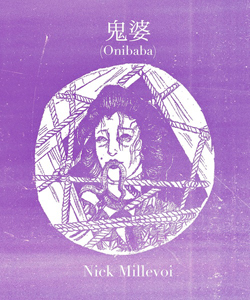 The two artists who are paired together on this split release differ in their sense of style and instrumentation, but what also unites them is a distinctly unique take on jazz improvisation. Millevoi may stick with a single instrument, the guitar, while (Onibaba)’s more diverse production and instrumentation has a different feel comparably. However, it is this improvisational nature of the recordings that makes it excel for both artists, with the right balance of order and noise.
The two artists who are paired together on this split release differ in their sense of style and instrumentation, but what also unites them is a distinctly unique take on jazz improvisation. Millevoi may stick with a single instrument, the guitar, while (Onibaba)’s more diverse production and instrumentation has a different feel comparably. However, it is this improvisational nature of the recordings that makes it excel for both artists, with the right balance of order and noise.
Millevoi (of Many Arms, Deveykus, and others) has played guitar in numerous different styles and configurations, but on his half, titled Numbers on the Side, he delves right into the rawer, harsher sounds the instrument can produce.Squalls of feedback, distortion, and infrequent riffs might sound (by that description) like a number of other projects, but his underlying compositional sense is what defines his half, resulting in a noisy piece of carefully ordered chaos.
The lengthy "Howling After the Endless Tandem Suns" leads off with a nicely raw bit of sustained guitar amp buzz, and any bit of subtlety is tossed out the window when the huge overdriven riffs kick in and extend outward under layers of distortion and fuzz.Millevoi is not afraid to throw on the guitar effects, but he uses them tastefully, never fully obscuring the instrument’s standard sound.Towards the end, however, he cranks everything up to be full on noise, alternating between shrill and guttural passages.
On "Rockets Redglare," what at least sounds to be an improvisation based on the "Star Spangled Banner," he doles out the scratchy, high pitched clanging notes to give it a harsh and aggressive.The jazz influence is rather clear here, however, with what at first sounds like being messy improv actually having a tight, underlying structure that remains obscured.A more conventional note progression eventually bubbles to the surface of "Where is the Crime?", but it is first a bunch of echoing scrapes and grating noise that is anything but musical.
(Onibaba) is a trio, and their improvisation style is a bit less obvious in the instrumentation compared to Millevoi, but the two lengthy pieces they contribute has the same combination of order and deconstruction."Sinking" immediately begins all dark and creepy, via echoing looped percussion and droning feedback.Bits of noise slip in and pull away just as quickly, and the clattering occasionally sneaks away, but continues to lurk in the background.
The other piece, "Dust," keeps the evil but scales back the dissonance a bit.There is a greater sense of space to be had, though it is frequently broken up by heavily reverberated thuds.Humming, wet digital drones and crackling static keep the ambience from getting too light, hiding the maliciousness that lurks just beneath the surface.
Superficially the jazz/improvisational feel of this split might seem subtle, but in actuality that sense of freedom with an underlying structure is all over this disc.Millevoi’s half would sound like something Ornette Coleman could have done if the guitar was swapped for a horn, and (Onibaba) work nicely as a trio, working off of each other to present a wide array of sounds without losing its loose sense of structure.Both artists contribute challenging compositions on here, but rewards are great, if admittedly dark and bleak in their nature.
samples:
 
Read More

